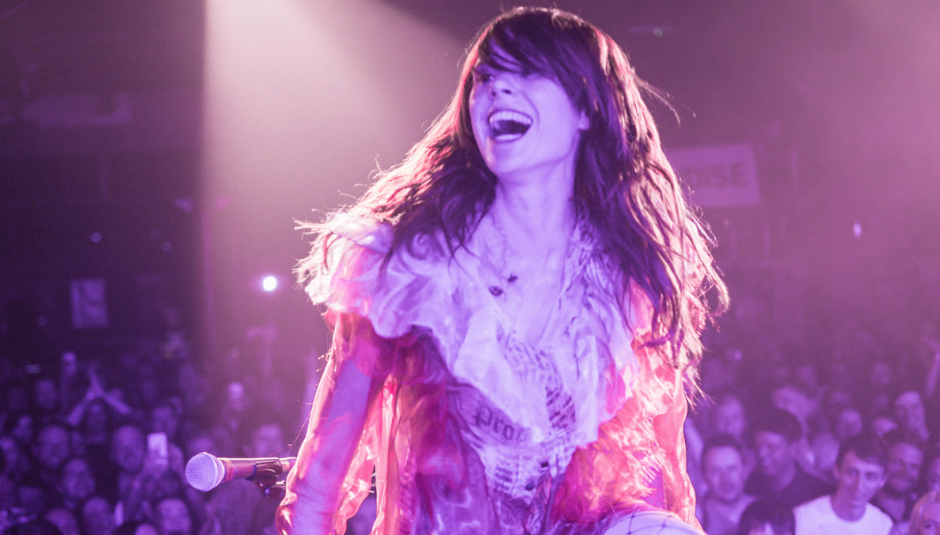Made Of Bricks came out during my first secondary-school summer. In that year of pre-puberty, I'd failed to kiss the mouth of the boy I liked. As term started again and us kids awkwardly rekindled in the school ground, we used clean, new pencil cases to help usher us into change. Here's my new back-pack and hasn't my hair grown over the long time apart? During those six weeks without the terrible burden of lunchtime opportunities to impress, to kiss – Kate Nash's 'Foundations' had been playing on the radio all summer long. We spent the holidays disparately, sedated by Friday night television, growing with immense speed as we wished the listless boredom away. We spent it in the backs of our parent's car, half-listening to the forthright and galumphing chords of the beaten keyboard. We followed the careening street lamps with our fingers, leapfrogging between them before the cockney sprechgesang demanded more of our attention: "First late night, everything's fine..."
It spun all summer long, and by the time we were back in class, the music lessons were spent re-enacting the song on keyboard: C chord, F chord, C, repeat. Clearly, what makes a song like 'Foundations' so durable is that it is a simple mnemonic. The kids who had no rhythm, no interest in the piano – I bet – could still play the song today. Those elementary chords, as I'm making the shapes now, work like a snake charm into the past. Through the haze and chimaeras of some more memories, the album endured beyond the summer and beyond its hit singles. We took the album's more mimetic moments along with us, 'Birds' was there when that desired mouth came closer, 'Nicest Thing' was there when we groped blindly at one another, 'We Got On' was there in the eternity of one youthful evening when each night became a cinema. As one Youtube commenter puts it: "I remember being in Year 7 when this song came out and we used to sing it during lessons. I'm now 20 and hate my life. Hahaha"
"It makes me feel nostalgic too," Kate Nash tells me, disrupting my own daydream. Our pasts hit us with a plangent strength, it should be said. Nostalgia works like gravity. "It's not just a nostalgia thing though," she says, further removing me from the reverie, "Kids who were just four when the album originally came out were singing along to every single word at my festival shows this summer." But for some reason, I can't leave the idea of nostalgia behind. The rift that has formed in these 10 years since Made Of Bricks has been one of the widest and paradigmatically shattering in semi-recent memory. Some triteness is required to illustrate the point: since 2007, Instagram happened, Snapchat happened; neoliberalism is no longer so insidiously covert.
"Now we have this multi-platform version of social media, we spend so much time just figuring out how to navigate it all. It's all maths and algorithm" she huffs. I can appreciate the differences between the social media now from how it was then, but I'm still surprised to hear Nash talk about it so rancorously. "The Myspace era was magical," she says. "Everything nowadays is so controlled and there's just no way to cheat the system. Back then, everything was produced by just one person and independence was encouraged. I think that's why it was shut down." Listening back to the darlings of the Myspace age – Jamie T, Jack Peñate, Laura Marling (before she became so affected and heard Joni Mitchell's Hejira for the first time) – were each, in a way, suis generis. Yes, their projects may have been a bit underdeveloped and undercooked, but that only seemed to add more gumption to this early-internet DIY epoch.
The music was fun and the kids were smart. Nash and her peers knew how to sell their product – even if unwittingly. Since their platform had been an entirely digital one, the aesthetic of the Myspace age harkened back to a pre-digital analogue world. Noah & The Whale, Laura Marling, and Nash all filmed their music videos using retro camcorders, with overlayed granularity and warm, orangey film scratches. Nash's greatest appeal was that she found the comedy in the contrasts. On 'Mouthwash', she banally sings over a chorus which has all the urgency of a sinking ship: "I use mouthwash, sometimes I floss / I've got a family and I drink cups of tea...". In the video for 'Foundations', she plays a foul-mouthed housewife. She's clad in a frumpy yellow dress as she passes her partner a beer and bakes him a cake, while she spits the crudely vernacular: "I'd rather be with your friends, mate, 'cos they are much fitter."
In a way, Nash captured all the self-fulfilling boredom of solitude and domesticity. "I wrote all the songs on Made Of Bricks when I was 16 and just messing about alone in my room," she tells me. It's an unimaginably private scenario to me; one I can only relate to through my own nostalgia. "We think we're connecting with all this technology, but everything's just an image" - and she's right. When we talk on messenger today, I doubt we really imagine the room that the other is inhabiting. What we're coming face to face with is just a digital embodiment. Nash brought the domestic into the outside world of interactions, and that's why so many made the 'Merry Happy' lyrics, "Dancing at discos, eating cheese on toast", their personal message on MSN.
She's halfway through her Made Of Bricks anniversary tour as we have this conversation. While she's playing songs that she'd written over a decade ago each night, she's just released the music video for her latest single, 'Call Me'. On first watch, it seems to harken back to her Foundations retro days. The analogue technology's back, and for some reason, she's yelling the lyrics at a fish tank. "It was actually recorded at the hospice my mum works at. She's been a nurse there for the past 40 years." With that, I'm able to make a little more sense of it. "I just think we should have a better relationship with death", she continues, "people think of hospices as these really depressing places, but they're not. They're full of happiness and positivity." In a balloon-strewn room, she dances with the dying as they chant Nash's song with her. "If you've been through something shit, I think you should use that energy to inspire positivity and to make other people feel good. I love happy people, I love caring people, and that's exactly what I strive to be myself."
It's a week before I'm to see Nash's show myself and I start to think about death and what Nash has said. Perhaps our veneration of the past; the reason why there's been such an onslaught of these album anniversary tours is that we simply can't accept death. Maybe, more specifically, we can't accept the death of 2007; when music was unambitious, anxiety was only dormant, and Donald Trump was just a reality TV star. 2007 was a cache in which Kate Nash could thrive. It's certainly not gone unnoticed that Nash has yet to repeat the success of Made Of Bricks. "I just don't fit into the music industry", she concludes. "In fact, I don't think the music industry is a good place to be for any woman. Even though they're the main focus of it, they just controlled by men who want to go back to the past. We need innovation." I ask her what she means by this. "Tyler the Creator is innovation, Chance the Rapper is innovation, Kickstarter is innovation." And, well yeah, fair enough.
"I'm ten years older now but I still listen back on Made Of Bricks now and sort of take my own advice from it", she confides. "Touring this album and playing these songs each night has made me consider absolutely everything: everything that's happened in the past ten years, all the love, all of the loss. It's made me revisit and step back from it all, and actually reconsider where I'm going with my life now." For some reason, Made Of Bricks isn't just an album, it's become a marker of our lives. I see this when I turn up to her show a week later. The 02 Empire is crammed with these one-time dancing at discos, eating cheese on toast devotees who, for just a couple of hours, are granted access to the impossible past. "For the first few songs, there's just screaming", Nash warned me the week before, and she's right. As the lights go down and the first song 'Play' begins, Nash takes to the stage where she's hit by a wall of screams. "I like to...play" the audience sing with her, in perfect timing. This doesn't let up for the next hour and a half either. Neither does Nash's energy levels – it's pretty remarkable. She thrashes around the stage with the stamina of a rrriot girl/marathon runner. She then settles down in front of her piano and plays those redolent chords: C chord, F chord, C, repeat. It seems everyone reacts to them with the same giddy hysteria, as though they'd just won the lottery.
The experience inspires both thoughtless ebullience and cogitative reflection. I look at the people around me and I think, this is it: this may be the happiest we could ever be. We are here, totally grounded in this moment; this is all there is, this will last forever, no one will ever die. The nostalgia-induced spell flickers, though – and that's the thing with nostalgia – it never truly grants us access to the lost garden of our past. The memories of who we were and who we loved 10 years ago are projected into the insides of our eyelids with an unreliably generous cinematography. But for now, we are both here and there. Does any other album of our generation trigger such a response? We still know every single word, even if we don't realise it. I think Made Of Bricks is a landmark of our generation, I told her the week before. "Wow. Thanks", she says. And suddenly, I have a craving for cheese on toast.
For more information about Kate Nash, including upcoming tour dates, please visit her official website.






















